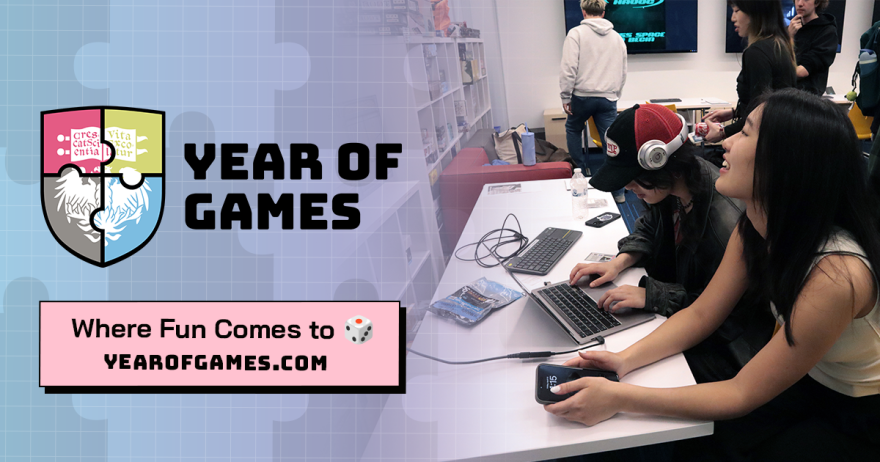During Year of Games, UChicago invites everyone to play

By Tori Lee
Sep 8, 2025
The University of Chicago has come to play. Throughout the 2025-26 academic year, UChicago will host the Year of Games, a campus-wide celebration of the art of play that brings together gamers across mediums and disciplines.
Over the past decade, UChicago has become a growing center of innovative game design and research. In the Weston Game Lab and Media Arts and Design program, students, faculty and staff develop experimental games—digital, board, card and alternate reality—that are driven by social impact.
“When I arrived at UChicago, I was immediately impressed by our faculty’s impressive research and teaching on games,” said Torsten Reimer, University librarian and dean of the University Library. “I saw a unique opportunity to bring together faculty and students from across campus, foster collaboration and advance scholarship through our campus-wide Year of Games.”
The yearlong campaign will officially launch with a kickoff symposium held Oct. 17-19 featuring more than two dozen game designers, artists, scholars, preservationists and industry innovators speaking on panels moderated by UChicago faculty.
Friday and Saturday’s keynotes will take the form of live tapings of My Perfect Console, a podcast hosted by journalist Simon Parkin, featuring Halo video game developer and Bungie Studio co-founder Alex Seropian, SB’91, and comic book writer and video game narrative designer Evan Narcisse.
The symposium, including keynote events, will take place at the Logan Center for the Arts. Attendance is free and open to all.
Want to play games created by the panelists ahead of the symposium? Organizers recommend checking out Haven, UFO 50, Kentucky Route Zero or Halo.
Beginning Sept. 15, game enthusiasts can also visit the Regenstein Library to see Charting Imaginary Worlds: Why Fantasy and Games are Inseparable, an exhibition exploring the long and fruitful relationship between the fantasy genre and play.
Don’t play video or board games? The Year of Games is still for you, organizers say. The University-wide partnership will feature events throughout the year, relating games and play to everything from music, religion and film to philosophy, contemporary art and medieval history.
“Games are already embedded in everything we do,” said Assistant Instructional Professor Chris Carloy, head of the Year of Games steering committee. “Games are ways that we learn, ways that we mediate and understand the world we're in.”
Want to follow along as the Year of Games unfolds? Join the mailing list and receive updates about upcoming events, programming highlights, and opportunities to get involved.
Already planning a game or play-related event? Fill out this Google form to propose an event to add to the Year of Games calendar.
Game library
There’s something inextricable about games and fantasy, says Carloy.
In Charting Imaginary Worlds: Why Fantasy and Games are Inseparable, on display at the Regenstein Library’s Special Collections exhibition gallery through Dec. 12, visitors can explore how the fantasy genre has long influenced games and vice versa.
“Fantasy produces deep lore and worldbuilding,” said Carloy, who co-curated the exhibition. “Games are particularly good at allowing for exploration of lore and encouraging fans to add to it.”
The exhibition traces this relationship through several examples, from the hugely popular Dungeons & Dragons to Baldur’s Gate 3, as well as books, maps and other objects from the past century. Visitors will also find game props, costumes, fan art and even an arcade of playable games.
Throughout the year, the Library will also showcase its ever-expanding gaming collection, which includes more than 600 video game titles across 60 consoles, most playable at the Weston Game Lab, located on the first floor of the John Crerar Library.
Members of the UChicago community can also check out adaptive gaming controllers designed specifically for players with disabilities.
During Autumn Quarter, the Library will launch the Games Cultural Objects Collection—a first-of-its-kind assemblage of artifacts dedicated to gaming culture. Housed in the Crerar Library, the collection includes figurines, collectables and fan-created items, all with the goal of preserving the culture and diverse stories of game fans.
“With their immense cultural and economic impact, games are increasingly important in our library collections and raise essential questions,” Reimer said, “such as how to preserve games accessed by billions through app stores for future generations.”
At UChicago, it’s game on
According to game scholar Prof. Patrick Jagoda, Chicago has been a gaming city for a long time; in the 1980s, the city was host to several pinball and coin-operated video game companies. Building on that legacy, Jagoda and other humanities scholars created the Media Arts and Design program at UChicago in the 2010s. To support the program, the University carved out dedicated spaces like the Weston Game Lab for the study of games.
Today, situated at the intersection of the humanities and computer science, students can major or minor in the program, taking courses in experimental game design, theory, electronic composition and more. For example, this fall, students can take “Critical Videogame Studies” with Ashlyn Sparrow and Jagoda in order to get a taste of both game studies and design.
“I hope the Year of Games will showcase the fabulous designs of our students, the thought-provoking work of our instructors, and the myriad game projects that have come out of our Weston Game Lab, Fourcast Lab and Game Changer Chicago Design Lab,” said Jagoda, faculty director of the Weston Game Lab. “This year is also an opportunity to make new connections with game designers around the United States and to deepen our embeddedness on the South Side of Chicago.”
The Year of Games is funded by the Division of Arts & Humanities and the University of Chicago Library with support from others including the University of Chicago Women’s Board, the Franke Institute for the Humanities, UChicago Arts and individual benefactors.